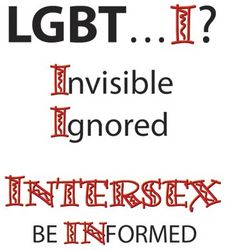Of course, there has never been an intersex voting block, or even an intersex political action committee. Indeed, despite the fact that there are tens of thousands of intersex people in this country, only a small number of people have publicly come out as "intersex." Where are the rest of intersex people?
Some do not know that they have an intersex condition, either because they have not been properly diagnosed or have not been told by their doctors and parents about their condition. Some do know about the condition that they have, but do not know that their condition may be considered part of intersex. Some reject the term "intersex" because of its negative association with "hermaphrodite" and other freaky imagery. For many, intersex is a site of pervasive physical and sexual violation, which they do not want to re-visit at all. Some wish to push away intersex as something that has happened in the past. Some are struggling hard just to stay alive. Some feel isolated and alienated by everyone around them, and do not feel that it is possible to "come out."
When we talk about intersex, we are talking about a lifelong history of shame, secrecy and isolation that are imposed on children who were born with slightly different bodies. We are talking about childhood sexual trauma, dirty family secret, repeated stripping in examination rooms, and the knowledge that whatever body you were born with was defective on arrival. It is not surprising that most people born with intersex conditions do not identify as "intersex" either publicly or privately.
As a result, the demographics of the few intersex activists who "come out" is skewed to be: mostly white, often college-educated, often LGBT or genderqueer (because queer people are already familiar with the process of coming out and doing activism, and also because they are more willing to go outside of standard sex/gender categories). This group, however, does not necessarily represent the rest of the people who are born with intersex conditions.
I personally do not consider "intersex" to be part of my identity. I feel that intersex is something that was done to me, not who I am. Nonetheless I am publicly "out" as an intersex activist, because I feel that taking such position is useful politically. Once people recognize me as an intersex activist, I can then start talking about what I actually feel about the label.
This creates a problem for the people who want to become allies to the intersex movement. If the few "out" intersex activists do not represent the rest, where should allies draw guidance as to what to do? How can allies act responsibly to the people who do not speak out?
As a relatively well-known intersex activist, I have come in contact with many people with intersex conditions who are not otherwise "out" as intersex or do not identify as intersex. Some of these people participate in condition-specific (such as CAH and AIS) support groups, while others are completely isolated. Even with the insight coming from these meetings, I am still unsure sometimes if certain things I say or do is actually in the best interest of intersex people as a whole.
There are some things that I am absolutely certain, such as that clitoral genitoplasty and vaginoplasty on a child is a bad idea. This is supported by many stories I have heard as well as the latest medical researches. But on other topics, such as when there was a discussion about whether or not to include "intersex" in PFLAG, I have had to make a judgment call based on everything I know about the situation and my own personal conviction.
As an ally, you will not get to hear from 99% of the people you are working to advocate for. But you are still accountable to them, as I am to my less vocal peers. Your best guide, aside from what "out" intersex activists will tell you, is your common sense.
Common sense should tell you that intersex people are regular people just like everyone else. Some are male, some are female, and there are few who explore alternative gender categoriesNjust like the non-intersex population. Some are gay or lesbian, some are bisexual, and some are straight. It makes no sense to assume that someone is gay or transgender because s/he is intersex, because a) there are gays and transgender people who aren't intersex, and b) there are intersex people who are not gay or transgender.
Common sense should tell you that whether or not one's genitalia matches her or his gender identity is not the only thing that matters. The problem with the intersex surgery is that it's harmful and in violation of the child's right to self-determination. The risk of assigning the "wrong gender" is not the only argument against thissurgery, nor is it the biggest one.
Common sense should tell you that using intersex babies to argue for some abstract theory or someone else's agenda, such as the social acceptance of a "third gender," is wrong. Most intersex people live happily as women or men just like everyone else, although they may be unhappy about the shame, secrecy and isolation that were imposed on them through medicine. If we were to advocate for the social acceptance of "third gender," that should be the responsibility of adults, whether intersex or not, rather than that of intersex children.
This is just the beginning. Use your common sense and focus on how to improve the lives of people with intersex conditions now and in the future. Ask us questions, but sometimes be willing to question the answers coming from the few "out" intersex activists including myself.

No comments:
Post a Comment